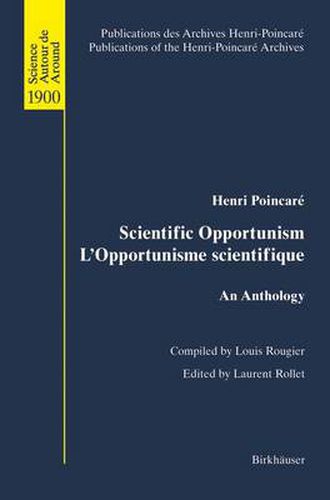Readings Newsletter
Become a Readings Member to make your shopping experience even easier.
Sign in or sign up for free!
You’re not far away from qualifying for FREE standard shipping within Australia
You’ve qualified for FREE standard shipping within Australia
The cart is loading…






This title is printed to order. This book may have been self-published. If so, we cannot guarantee the quality of the content. In the main most books will have gone through the editing process however some may not. We therefore suggest that you be aware of this before ordering this book. If in doubt check either the author or publisher’s details as we are unable to accept any returns unless they are faulty. Please contact us if you have any questions.
During his lifetime, Henri Poincare published three major philosophical books which achieved great success: La science et l'hypothese (1902), La valeur de la science (1905) and Science et methode (1908). After his death in 1913, a fourth volume of his philosophical works was published by his heirs as Dernieres pensees (1913). The four books constitute the core of Poincare’s philosophic works and were given an ovation by scientific and general public. Around 1919, Gustave Le Bon wrote to Poincare’s widow. As the director of the Bibliotheque de Philosophie Scientifique at Flammarion , he asked her permission to publish a second posthumous volume. L'Opportunisme scientifique was intended to be the fifth and final volume of Poincare’s philosophical writings. Louis Rougier had elaborated the project, with the collaboration of Gustave Le Bon, and the approval of the philosopher Emile Boutroux and his son Pierre. Because of the reservations of the mathematician’s heirs, this book was never published and Dernieres pensees remained his last philosophical book. Nevertheless Poincare’s correspondence - which is kept in the Poincare Archives at University Nancy 2 - contains a large amount of documents concerning the project, its justification and the discussions between Louis Rougier and the mathematician’s heirs. The aim of this book is to restore this episode, which gives some crucial informations about editorial practices of Poincare and about the posterity of his philosophic thinking.
$9.00 standard shipping within Australia
FREE standard shipping within Australia for orders over $100.00
Express & International shipping calculated at checkout
This title is printed to order. This book may have been self-published. If so, we cannot guarantee the quality of the content. In the main most books will have gone through the editing process however some may not. We therefore suggest that you be aware of this before ordering this book. If in doubt check either the author or publisher’s details as we are unable to accept any returns unless they are faulty. Please contact us if you have any questions.
During his lifetime, Henri Poincare published three major philosophical books which achieved great success: La science et l'hypothese (1902), La valeur de la science (1905) and Science et methode (1908). After his death in 1913, a fourth volume of his philosophical works was published by his heirs as Dernieres pensees (1913). The four books constitute the core of Poincare’s philosophic works and were given an ovation by scientific and general public. Around 1919, Gustave Le Bon wrote to Poincare’s widow. As the director of the Bibliotheque de Philosophie Scientifique at Flammarion , he asked her permission to publish a second posthumous volume. L'Opportunisme scientifique was intended to be the fifth and final volume of Poincare’s philosophical writings. Louis Rougier had elaborated the project, with the collaboration of Gustave Le Bon, and the approval of the philosopher Emile Boutroux and his son Pierre. Because of the reservations of the mathematician’s heirs, this book was never published and Dernieres pensees remained his last philosophical book. Nevertheless Poincare’s correspondence - which is kept in the Poincare Archives at University Nancy 2 - contains a large amount of documents concerning the project, its justification and the discussions between Louis Rougier and the mathematician’s heirs. The aim of this book is to restore this episode, which gives some crucial informations about editorial practices of Poincare and about the posterity of his philosophic thinking.